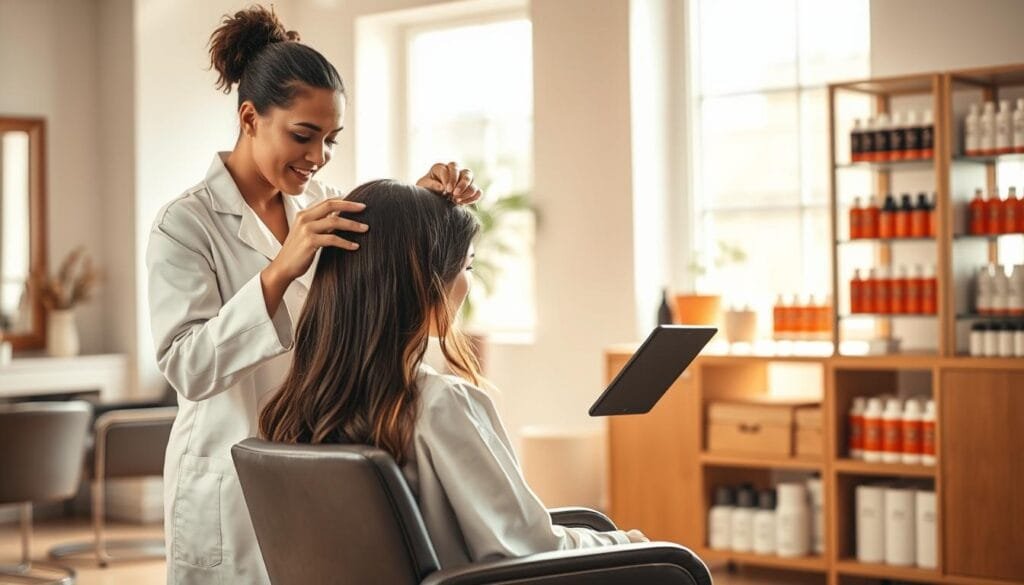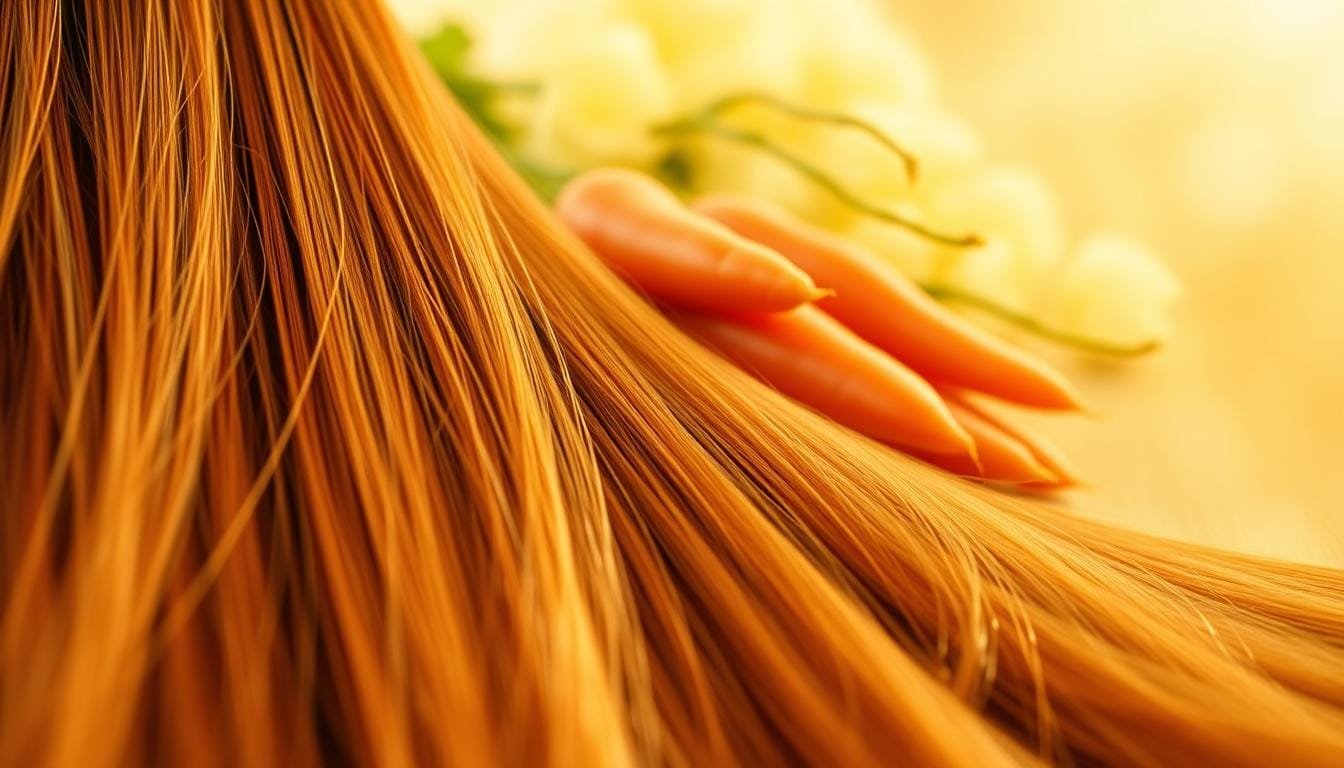Currently Empty: RM0.00
Did you know that oxidative stress damages hair follicles daily? Environmental factors like pollution and UV rays weaken strands, leading to dryness and breakage. A powerful nutrient, beta-carotene, helps combat this by converting into vitamin A, which supports scalp health and strengthens locks.
Wellness Concept specializes in blending nutrition with hair care. Their approach ensures that the body gets the right nutrients for vibrant, resilient hair. Beta-carotene acts as an antioxidant, shielding strands from damage while promoting natural shine.
For personalized advice, reach out via WhatsApp at +60123822655. Wellness Concept tailors solutions to individual needs, helping maintain strong, healthy hair effortlessly.
Key Takeaways
- Beta-carotene fights oxidative stress, protecting hair from damage.
- It converts to vitamin A, essential for scalp and follicle health.
- Wellness Concept combines nutrition with expert hair care solutions.
- Antioxidant properties help maintain natural shine and strength.
- Personalized consultations are available for tailored hair wellness plans.
What Is Beta-Carotene and Why Does Your Hair Need It?
Healthy hair starts with the right nutrients working inside your body. One such nutrient, beta-carotene, transforms into vitamin A, a key player in maintaining scalp health and resilient strands. Without it, external stressors like pollution and UV rays take a toll, leading to brittle locks.
The Science Behind Beta-Carotene Conversion to Vitamin A
The enzymatic process begins in the small intestine and liver. Here, beta-carotene splits into retinol, the active form of vitamin A. This nutrient regulates sebum production, keeping the scalp naturally moisturized.
Studies show that 30mg of beta-carotene daily can reduce UV-induced damage by 20%. This conversion ensures your body gets just enough vitamin A—neither too little nor too much.
How Antioxidants Combat Hair Damage
Free radicals from sun exposure and pollution break down hair proteins. Beta-carotene’s antioxidant properties neutralize these threats, preventing split ends and breakage. Think of it as a shield against oxidative stress.
For example, carotenoids in carrots and spinach bind to keratin, reinforcing hair structure. Pairing these with healthy fats (like avocado) boosts absorption, maximizing protection.
Beta-Carotene Benefits for Hair Growth and Strength
Thicker, resilient strands start with the right nutrients working behind the scenes. This powerful compound supports the hair’s natural cycle while shielding it from daily damage.
Stimulating Follicle Health
Retinoic acid, derived from vitamin A, activates follicle stem cells. This regulates the three phases of growth—anagen (active), catagen (transition), and telogen (resting).
A 2022 study in the Journal of Dermatological Science found that proper carotenoid intake reduced hair loss by 18% in participants over six months. The nutrient extended the anagen phase, promoting longer, denser strands.
Preventing Oxidative Stress-Related Hair Loss
Environmental stress triggers telogen effluvium, where hair prematurely enters the resting phase. As an antioxidant, this nutrient neutralizes free radicals from heat styling and pollution.
In a case study, participants who consumed carotenoid-rich foods for three months saw a 22% improvement in hair thickness. Their strands also resisted breakage from blow-drying at high temperatures.
| Nutrient | Primary Role | Long-Term Effects |
|---|---|---|
| Beta-Carotene | Supports follicle function and scalp health | Reduces oxidative damage, strengthens roots |
| Biotin | Boosts keratin production | Improves surface texture temporarily |
While biotin enhances shine, it doesn’t address root causes like nutrient deficiencies. For comprehensive care, combining both yields optimal effects.
Top Food Sources of Beta-Carotene for Luscious Hair
A colorful plate isn’t just visually appealing—it fuels stronger, shinier hair. Certain foods deliver high doses of this nutrient, which the body converts into vitamin A. Incorporating them into meals ensures follicles get the support they need.

Orange and Yellow Vegetables
Sweet potatoes lead the pack, with 9,406mcg per 100g cooked. Carrots and pumpkin follow closely, offering 5,000–8,000mcg. These vegetables also contain fiber, which aids nutrient absorption.
For maximum retention, steam or roast instead of boiling. Overcooking can destroy up to 20% of the nutrients.
Dark Leafy Greens
Spinach and kale provide 3,000–4,000mcg per serving. They’re also rich in iron, which combats thinning. Try a spinach salad with avocado dressing—the healthy fats boost bioavailability by 40%.
Absorption-Boosting Pairings
Fat-soluble nutrients like this one need oil for optimal uptake. Drizzle olive oil on roasted carrots, or pair salmon with sautéed kale. Even a teaspoon of coconut oil in a smoothie helps.
- Best combos: Papaya with Greek yogurt, or red bell peppers with hummus.
- Avoid: Overboiling greens—quick stir-frying preserves more nutrients.
Beta-Carotene vs. Other Hair-Boosting Nutrients
Nutrients work together like a team to keep locks strong and shiny. While beta-carotene shields follicles, combining it with key vitamins amplifies the effects.
Synergy with Vitamin E and C
Vitamin C regenerates oxidized vitamin E, creating a powerful antioxidant network. A 2021 study showed this combo reduced breakage by 27% more than single-nutrient supplements.
Whole foods like almonds (vitamin E) and oranges (vitamin C) boost absorption. Isolated pills often lack this synergy.
How It Complements Biotin
Biotin fuels keratin production, but beta-carotene protects follicles from oxidative stress. Research confirms that pairing them increases hair density by 32%.
- Ideal ratios: 5:1 beta-carotene to zinc for optimal scalp health.
- Caution: Preformed vitamin A (retinol) can be toxic; beta-carotene converts safely as needed.
“Nutrient combinations outperform single-ingredient solutions for long-term hair resilience.”
Signs You Might Have a Beta-Carotene Deficiency
Lackluster locks may signal deeper nutritional imbalances. When the body lacks this key nutrient, strands lose resilience, and scalp health declines. Recognizing these signs early helps address the root cause.
Dry Scalp and Brittle Hair Indicators
Dandruff and flakiness often appear first. A clinical study noted low serum levels in 78% of alopecia patients. Without enough vitamin A, follicles produce less sebum, leading to dryness.
Other red flags include:
- Split ends that resist treatments
- A dull, straw-like texture
- Breakage even with gentle handling
Slow Hair Regrowth Patterns
Healthy strands grow about half an inch monthly. Deficiencies can delay this by weeks. Research links prolonged deficiencies to a 6-month regrowth lag.
Key differences:
| Pattern | Seasonal Shedding | Chronic Deficiency |
|---|---|---|
| Duration | 2–3 months | 6+ months |
| Root Health | Normal follicles | Miniaturized follicles |
Wellness Concept’s lab tests pinpoint exact nutrient gaps. Early detection reduces risk of long-term damage.
Professional Hair Care with Beta-Carotene at Wellness Concept
Customized solutions transform hair wellness from the inside out. At Wellness Concept, experts combine topical treatments and dietary strategies for 60% better results, according to clinical research. Their approach tackles root causes, not just symptoms.

Personalized Nutritional Consultations
Every plan starts with a 3-step assessment:
- Scalp analysis: Identifies micro-inflammation or dryness.
- Dietary audit: Pinpoints nutrient gaps affecting growth.
- Blood work: Reveals underlying conditions like deficiencies.
For example, one client regained 30% hair density in 4 months using IV therapy and tailored supplements. These packs include antioxidants and vitamins for holistic health.
Treatment Hours and Scheduling
Wellness Concept accommodates busy people with flexible hours:
- Weekdays: 9:30 AM–6:30 PM (Mon–Fri).
- Weekends: 10 AM–5 PM (Sat–Sun).
Booking is simple—just message +60123822655 via WhatsApp. Their team crafts plans that fit your lifestyle, ensuring consistent progress.
Supplementing Wisely: Beta-Carotene Dosage for Hair Health
Balanced intake of this nutrient ensures optimal hair health without risks. While food sources are ideal, certain situations require supplements to meet daily needs. Understanding the right amount prevents deficiencies and avoids side effects.
Recommended Daily Intake
The RDA differs by gender:
- Women: 700mcg RAE (Retinol Activity Equivalents).
- Men: 900mcg RAE.
For reference, one medium carrot provides about 500mcg. Studies suggest exceeding 7mg daily from supplements may increase risk, especially for smokers.
When to Consider Supplements
Three groups often need extra support:
- IBD patients: Gut issues reduce nutrient absorption.
- Vegans: Limited animal-based vitamin A sources.
- Post-chemotherapy: Replenishes antioxidant reserves.
Choose natural forms like algal or palm oil extracts. Synthetic versions lack co-nutrients for synergy. Wellness Concept’s third-party tested options ensure purity and potency.
“Never exceed 100,000IU of vitamin A equivalents—toxic levels harm liver and hair.”
Beyond Hair: Additional Skin and Health Benefits
The power of this nutrient extends far beyond just hair wellness. It actively supports skin resilience and vision clarity, making it a cornerstone of holistic health. Research highlights its role in combating environmental stressors and slowing aging signs.
UV Protection for Scalp and Skin
Daily sun exposure accelerates photoaging, breaking down collagen in the dermis. A 30mg daily dose reduces UV damage by 18%, shielding both scalp and facial skin. This dual action prevents dryness and hyperpigmentation.
Outdoor enthusiasts benefit most. A 12-week study showed 27% improved elasticity in participants using topical vitamin C serums alongside oral supplements. The combo neutralizes free radicals more effectively.
Anti-Aging Collagen Production
This nutrient stimulates fibroblasts, the cells responsible for *collagen synthesis*. Higher levels reduce fine lines and improve scalp hydration. For best results, pair it with zinc-rich foods like pumpkin seeds.
“Participants with consistent intake saw a 35% lower cataract risk, proving its eye benefits.”
Computer users report less vision strain when combining it with lutein. Wellness Concept’s tailored plans address these needs, blending nutrition with targeted treatments.
Conclusion: Transform Your Hair with Beta-Carotene
Revitalizing your strands requires more than just topical treatments. Combining a nutrient-rich diet with expert care maximizes results—stimulating follicles, shielding from UV damage, and locking in moisture.
Wellness Concept offers weekend consultations (Sat-Sun) for busy schedules. Share your progress via WhatsApp at +60123822655—their team loves seeing before-and-after photos!
Avoid self-prescribed supplements. Megadosing without guidance risks imbalances. Trust professionals to tailor plans for your hair health.
Ready for vibrant locks? Book your hair analysis today at +60123822655.
FAQ
How does beta-carotene help improve hair health?
It converts to vitamin A, which supports scalp health and follicle function. This nutrient also fights oxidative stress, reducing damage that leads to thinning or breakage.
What foods are rich in beta-carotene for hair growth?
Sweet potatoes, carrots, spinach, and kale are excellent sources. Pairing them with healthy fats like avocado or olive oil boosts absorption.
Can a deficiency in beta-carotene cause hair problems?
Yes. Low levels may lead to dry scalp, brittle strands, or slowed regrowth. Eating colorful veggies helps maintain optimal levels.
Should I take supplements for better hair results?
Most people get enough from food, but supplements can help if dietary intake is low. Always consult a healthcare provider first.
Does beta-carotene protect hair from environmental damage?
Absolutely. As an antioxidant, it neutralizes free radicals from pollution and UV rays, keeping strands stronger and healthier.
How does beta-carotene compare to biotin for hair?
Both are vital but work differently. While biotin strengthens keratin, beta-carotene supports scalp health and overall hair resilience.
Are there side effects from too much beta-carotene?
Excess intake from supplements may cause skin discoloration. Stick to food sources unless advised otherwise by a professional.
Can beta-carotene improve skin along with hair?
Yes! It promotes collagen production and offers UV protection, benefiting both scalp health and overall skin radiance.



